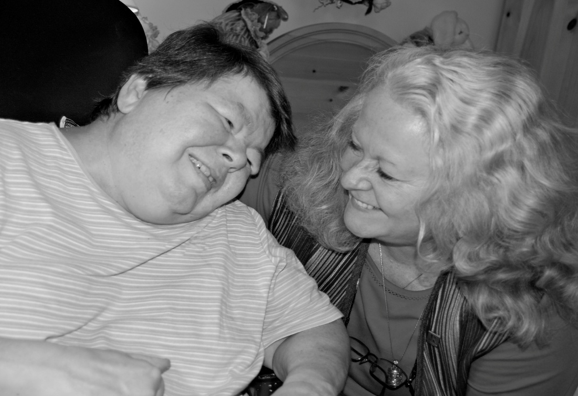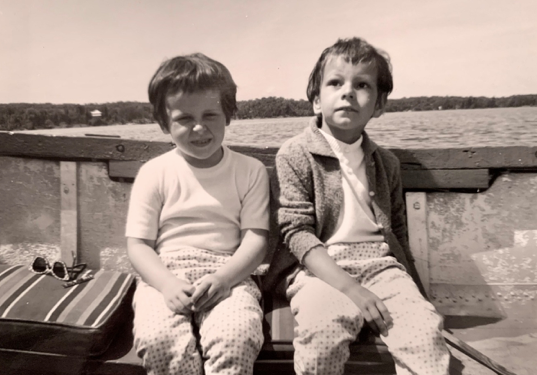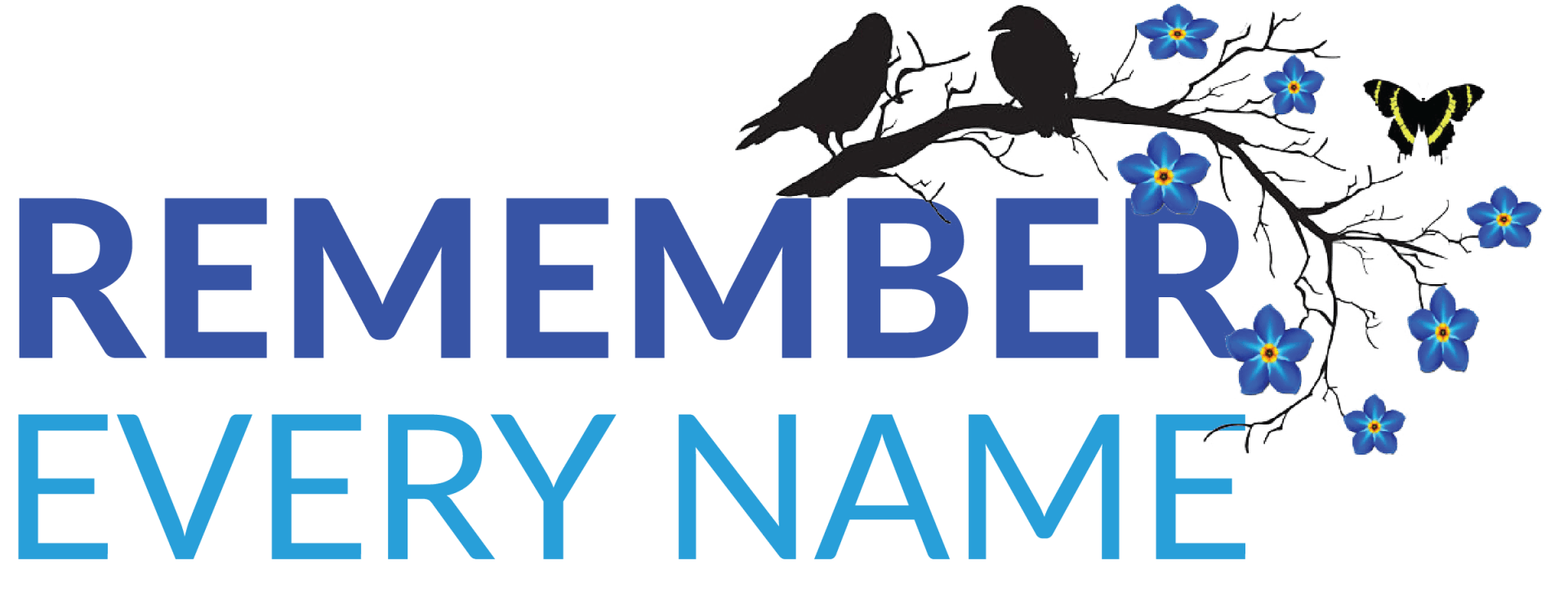Karen’s Legacy

I would like to introduce you to my late sister Karen Jobbins who inspired us all to do better at supporting people who have disabilities. Her story may resonate with a few of you.
Most of you have never met my sister Karen but she lived a courageous life as a teacher and an influencer to those who loved and respected her.
Karen was the first born on January 31, 1955. Her arrival into this world was difficult and cruel. With the use of forceps during delivery she sustained a head injury causing cerebral palsy and a developmental delay and later the onset of epilepsy.
The odds were against her because she could have died.
The doctor predicted she would only live a few short years- maybe one or two, that someday my mother would find her dead in her crib. Instead, she survived for 66 years. Karen proved that doctor wrong.
Then I came along.
When we were little, my sister Karen and I were inseparable. So close in age, milestones were compared and measured. We were even dressed alike and had the same hair cuts. We loved camping with our parents out on Parry Island, Georgian Bay, getting there in the boat Dad built in the basement as a winter project. For as long as I can remember, Karen loved the water. If it wasn’t swimming and running around at the beach together, it would be kicking water in our wadding pool on hot summer days playing in the front yard and drinking Koolaid with the neighbouring kids who would come and join us.
The odds were against Karen at a time when thousands of other children like her were shuttered away into institutions across this province.
My parents resisted pressure from professionals who told them to put Karen "away" at the Ontario Hospital School that loomed nearby in Orillia, that the family would be better off forgetting her altogether. That's the kind of "help" that was available for families in those days in the late 50’s and early 60’s when Karen was a toddler.
Karens influence on our parents gave them the resolve to resist that pressure from the professionals, that she was their responsibility and would remain with the family despite having little or no support in the community for her.
When we lived in Parry Sound we went our separate ways to go to school. I was in Grade one- Karen went to a day care at the neighbours' house-even though she was older than me.
The odds were against her because kids like Karen weren’t expected to learn or go to school.
In the 1960’s we moved from Parry Sound to Muskoka, in the country, on the lake near Port Carling near where our Grandparents lived, along with Aunts and Uncles and all our cousins. Our parents built the family home on Brackenrig Bay.

Many hot summer days were spent down at the lake playing at the beach catching lily pads or floating around in grandpa’s punt. Weekends were special because sometimes it meant we were going for a boat ride and picnic with our grandparents out to the island for a swim.
In the winter months our family were avid snowmobilers exploring the lakes and meeting up with other families for a cookout lunch. Dad would hook up the dog sled to the snowmobile for us - Karen in her seat, our younger sister at her feet and I standing on the back - while our younger brother was on the back of the snowmobile with dad. Mom would follow behind to make sure none of us fell off.
I went to public school in Port Carling, my sister travelled to Bracebridge to a day care in the United church basement. When I was nine I started getting in trouble at school retaliating with kids who were taunting my sister while we rode the school bus part way together. My dad had to explain my sister was “mentally retarded”. The words sounded ugly and foreign to me. I knew she learned things slower than others but I did not see my sister in terms of disability, I loved her as my big sister.
The odds were against her because people like Karen were labelled and discriminated against.
Our parents realized that Karen and other kids like her should be going to a real school to get an education, with books, blackboards, teachers and expectations. They worked hard and came together to organize with other parents who had children like Karen and formed what is now Community Living South Muskoka. They got the whole community involved with fundraising efforts to build Victoria Street School in Bracebridge which opened in 1968. What a huge influence Karen had!
Karen attended Victoria Street School until she was 21. I remember typing the letter my father wrote to the Minister of Education asking that students should be able to attend school up to the age of 21 years. Because of that, legislation was passed allowing for this.
After Karen aged out of the school system, she went to ARC Industries-a sheltered workshop, which the parents' group had built. It turned out that she was unhappy there, so she stayed home from then on, with our parents. I left home to go to college to pursue a career working for people with developmental disabilities because my sister taught and inspired me. For 25 years in two provinces, my focus was to help move people from government run institutions back to the community with supports.
Father became seriously ill and before he died, he asked us to promise never to institutionalize Karen. He had worked hard for so many years to build supports in the community pioneering the local association. Karen inspired him to make sure people stayed out of the two large government run institutions that loomed nearby, one being Muskoka Centre in Gravenhurst and the Ontario Hospital School later known as Huronia Regional Centre in Orillia.
But the odds were against Karen because there was not enough support in the community for her to live a happy life on her own terms.
Instead, she inspired my mother and I to work hard to advocate on her behalf. With the help and advice from our friend Marilyn Dolmage, we were inspired by her son Matthew’s example. They blazed a path for Karen by sharing that individualized funding could make a good life in the community possible. Through them, we learned about Special Services at Home, later known as Passport funding for adults.
Eventually Karen was granted individualized direct funding to hire her “girls” who helped her with walks, going out of the family home and swimming at the pool. She was the only person to have this funding “annualized” - guaranteed from year to year - then, in the northeastern region of the province.
Karen inspired our local MPP Norm Miller to advocate in the legislature for this funding. Karen was an inspiration to others who learned from her example. It became a movement with families across the province forming Family Alliance Ontario, wanting the same type of arrangement in the form of secure direct funding to support their children with disabilities. Karen helped influence a lot of families!
Karen loved to go to town to swim at the pool, shop, attend appointments, and run errands - simple things everyone else takes for granted. My mother got a break – which some people would have called it "respite", but Karen’s “girl’s night outs” provided so much more. Sometimes she went out of town overnight with "her girls" to catch a show at Deerhurst or to a shopping mall in the city. She enjoyed her visits to Wind Reach farm where she could pick apples from the orchard or feed the animals, going for a hay wagon ride while staying overnight. Karen was enjoying happy and enriching opportunities, while still living at the family home with our mother.
All was going well for my sister until our mother had declining health which required surgery preventing her from continuing to care for Karen at home.
We tried very hard to be prepared, and proactive, hoping for a partnership with community and government departments responsible. We met with government officials and submitted a proposal to the Ministry of Community & Social Services-to support a plan for Karen to move from the family home into a home of her own in the town of Bracebridge. Part of the plan was that she could continue to benefit from the love, support and unpaid care-giving provided by her family along with live-in support. We said we wanted a safe and secure future for Karen. She had always lived in the community surrounded by family and friends and we wanted this to continue and expand.
The odds were against her because the government told us she should move into a group home instead of having a home of her own.
Not only did my sister not want to move to a group home but there was a wait-list years long. Time ran out. Karen moved in with me and my family as an emergency plan to avoid moving to a long-term care facility to live with the frail and elderly. My mother could not see any other place for her to go and worried my husband and I would not be able to manage while raising our own family and working full time.
I hoped I could keep my promise to my father never to institutionalize my sister but the odds were against her.
A few months later my mother was informed that a “long-term care” bed was available for Karen because her name was on a list as a priority placement. On July 15th, 2005 my sister was institutionalized at the age of 50.
The odds were against Karen for community living.
Now she lived a sheltered and limited life within the confines of the facility. Rarely did she go out anymore but she enjoyed the regular visits from her mother and whenever the rest of her family and friends popped in to see her.
And then COVID hit. We were all under lockdown no longer able to visit or check in with Karen. She was so courageous to survive all those lonely 18 months with most of her time spent in her room only to go out to the dining room for her meals.
The odds were against her when she was admitted to the hospital in March 2021 with a serious infection which almost took her life.
Because she was considered palliative, I was able to become her essential caregiver allowing me to visit everyday to help her recover. Karen rallied and it was looking hopeful she would regain her health to have better days ahead. But this would not be. Karen sadly and quietly passed away alone in the early morning hours of October 31, 2023 at the age of 66.
With Karen’s passing, donations were made in her name towards the Twin Points Trail Barrier Free Access & Viewing Platform in Killbear Provincial Park on Georgian Bay. Upon completion this project, it will provide access to one of the trails for individuals with mobility challenges so that visitors and campers can enjoy the beauty and ruggedness of the Georgian Bay area. Karen’s name will be inscribed on the plaque at the entrance of Twin Points Trail. This celebrates those years we enjoyed the outdoors together, as two loving sisters.
Although the odds were so great against her, she influenced so many people with disabilities and their families. Over her lifetime, she inspired this community to create support programs and because those programs did not always meet her needs, Karen’s story continues to challenge us to change – to see people not as Community Living clients but to ensure they are valued citizens, participating fully at the heart of true community.
Rest peacefully Karen.
- Written by Debbie Vernon
